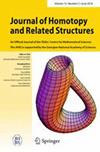论etc中的相对k群,第二部分
IF 0.7
4区 数学
Q2 MATHEMATICS
引用次数: 0
摘要
在上一篇论文中,我们证明了在某些假设下,等变Tamagawa数猜想(ETNC)的Burns-Flach公式中的相对k群与局部紧等变模的k群是正则同构的。我们的方法和标准的方法都涉及到演示:一个是由于Bass-Swan,应用于有限生成的投影模块的类别;另一个是Nenashev的,应用于我们的拓扑模块,没有有限生成假设。本文给出了一个显式同构。本文章由计算机程序翻译,如有差异,请以英文原文为准。
On the relative K-group in the ETNC, Part II
In a previous paper we showed that, under some assumptions, the relative K-group in the Burns–Flach formulation of the equivariant Tamagawa number conjecture (ETNC) is canonically isomorphic to a K-group of locally compact equivariant modules. Our approach as well as the standard one both involve presentations: One due to Bass–Swan, applied to categories of finitely generated projective modules; and one due to Nenashev, applied to our topological modules without finite generation assumptions. In this paper we provide an explicit isomorphism.
求助全文
通过发布文献求助,成功后即可免费获取论文全文。
去求助
来源期刊

Journal of Homotopy and Related Structures
MATHEMATICS-
CiteScore
1.20
自引率
0.00%
发文量
21
审稿时长
>12 weeks
期刊介绍:
Journal of Homotopy and Related Structures (JHRS) is a fully refereed international journal dealing with homotopy and related structures of mathematical and physical sciences.
Journal of Homotopy and Related Structures is intended to publish papers on
Homotopy in the broad sense and its related areas like Homological and homotopical algebra, K-theory, topology of manifolds, geometric and categorical structures, homology theories, topological groups and algebras, stable homotopy theory, group actions, algebraic varieties, category theory, cobordism theory, controlled topology, noncommutative geometry, motivic cohomology, differential topology, algebraic geometry.
 求助内容:
求助内容: 应助结果提醒方式:
应助结果提醒方式:


